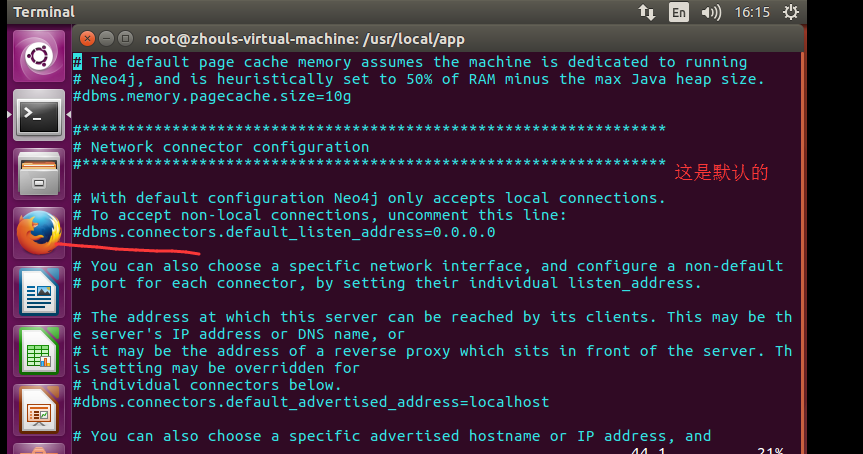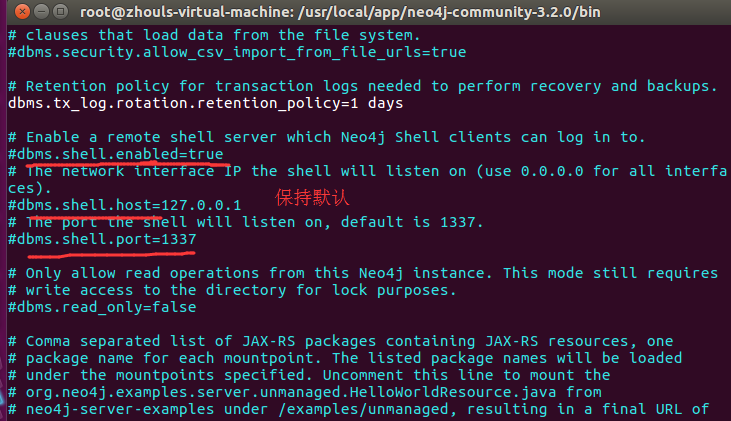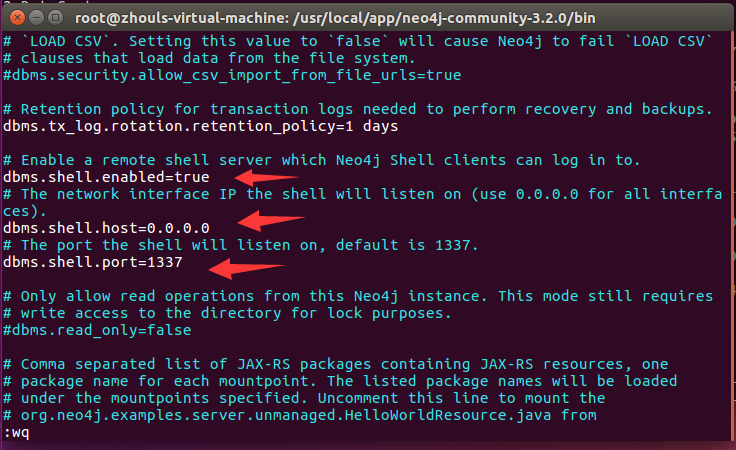neo4j的配置文件(图文详解)
2017-06-02 16:03
429 查看
不多说,直接上干货!
[b]前期博客[/b]
[b] 一、[/b]
由

变成

[b]二、[/b]
由

改成

[b]前期博客[/b]
Ubuntu16.04下Neo4j图数据库官网安装部署步骤(图文详解)(博主推荐)
Ubuntu14.04下Neo4j图数据库官网安装部署步骤(图文详解)(博主推荐)
neo4j的配置文件(默认的)#***************************************************************** # [b]Neo4j configuration[/b] # # For more details and a complete list of settings, please see # https://neo4j.com/docs/operations-manual/current/reference/configuration-settings/ #***************************************************************** # The name of the database to mount #dbms.active_database=graph.db # Paths of directories in the installation. #dbms.directories.data=data #dbms.directories.plugins=plugins #dbms.directories.certificates=certificates #dbms.directories.logs=logs #dbms.directories.lib=lib #dbms.directories.run=run # This setting constrains all `LOAD CSV` import files to be under the `import` directory. Remove or comment it out to # allow files to be loaded from anywhere in the filesystem; this introduces possible security problems. See the # `LOAD CSV` section of the manual for details. dbms.directories.import=import # Whether requests to Neo4j are authenticated. # To disable authentication, uncomment this line #dbms.security.auth_enabled=false # Enable this to be able to upgrade a store from an older version. #dbms.allow_format_migration=true # Java Heap Size: by default the Java heap size is dynamically # calculated based on available system resources. # Uncomment these lines to set specific initial and maximum # heap size. #dbms.memory.heap.initial_size=512m #dbms.memory.heap.max_size=512m # The amount of memory to use for mapping the store files, in bytes (or # kilobytes with the 'k' suffix, megabytes with 'm' and gigabytes with 'g'). # If Neo4j is running on a dedicated server, then it is generally recommended # to leave about 2-4 gigabytes for the operating system, give the JVM enough # heap to hold all your transaction state and query context, and then leave the # rest for the page cache. # The default page cache memory assumes the machine is dedicated to running # Neo4j, and is heuristically set to 50% of RAM minus the max Java heap size. #dbms.memory.pagecache.size=10g #***************************************************************** # [b]Network connector configuration[/b] #***************************************************************** # With default configuration Neo4j only accepts local connections. # To accept non-local connections, uncomment this line: #dbms.connectors.default_listen_address=0.0.0.0 # You can also choose a specific network interface, and configure a non-default # port for each connector, by setting their individual listen_address. # The address at which this server can be reached by its clients. This may be the server's IP address or DNS name, or # it may be the address of a reverse proxy which sits in front of the server. This setting may be overridden for # individual connectors below. #dbms.connectors.default_advertised_address=localhost # You can also choose a specific advertised hostname or IP address, and # configure an advertised port for each connector, by setting their # individual advertised_address. # Bolt connector dbms.connector.bolt.enabled=true #dbms.connector.bolt.tls_level=OPTIONAL #dbms.connector.bolt.listen_address=:7687 # HTTP Connector. There must be exactly one HTTP connector. dbms.connector.http.enabled=true #dbms.connector.http.listen_address=:7474 # HTTPS Connector. There can be zero or one HTTPS connectors. dbms.connector.https.enabled=true #dbms.connector.https.listen_address=:7473 # Number of Neo4j worker threads. #dbms.threads.worker_count= #***************************************************************** # [b]Logging configuration[/b] #***************************************************************** # To enable HTTP logging, uncomment this line #dbms.logs.http.enabled=true # Number of HTTP logs to keep. #dbms.logs.http.rotation.keep_number=5 # Size of each HTTP log that is kept. #dbms.logs.http.rotation.size=20m # To enable GC Logging, uncomment this line #dbms.logs.gc.enabled=true # GC Logging Options # see http://docs.oracle.com/cd/E19957-01/819-0084-10/pt_tuningjava.html#wp57013 for more information. #dbms.logs.gc.options=-XX:+PrintGCDetails -XX:+PrintGCDateStamps -XX:+PrintGCApplicationStoppedTime -XX:+PrintPromotionFailure -XX:+PrintTenuringDistribution # Number of GC logs to keep. #dbms.logs.gc.rotation.keep_number=5 # Size of each GC log that is kept. #dbms.logs.gc.rotation.size=20m # Size threshold for rotation of the debug log. If set to zero then no rotation will occur. Accepts a binary suffix "k", # "m" or "g". #dbms.logs.debug.rotation.size=20m # Maximum number of history files for the internal log. #dbms.logs.debug.rotation.keep_number=7 #***************************************************************** #[b] Miscellaneous configuration[/b] #***************************************************************** # Enable this to specify a parser other than the default one. #cypher.default_language_version=3.0 # Determines if Cypher will allow using file URLs when loading data using # `LOAD CSV`. Setting this value to `false` will cause Neo4j to fail `LOAD CSV` # clauses that load data from the file system. #dbms.security.allow_csv_import_from_file_urls=true # Retention policy for transaction logs needed to perform recovery and backups. dbms.tx_log.rotation.retention_policy=1 days # Enable a remote shell server which Neo4j Shell clients can log in to. #dbms.shell.enabled=true (远程访问,需要时可以放开) # The network interface IP the shell will listen on (use 0.0.0.0 for all interfaces). #dbms.shell.host=127.0.0.1 (远程访问的机器地址,需要时可以放开,为0.0.0.0) # The port the shell will listen on, default is 1337. #dbms.shell.port=1337 (远程访问端口,需要时可以放开) # Only allow read operations from this Neo4j instance. This mode still requires # write access to the directory for lock purposes. #dbms.read_only=false # Comma separated list of JAX-RS packages containing JAX-RS resources, one # package name for each mountpoint. The listed package names will be loaded # under the mountpoints specified. Uncomment this line to mount the # org.neo4j.examples.server.unmanaged.HelloWorldResource.java from # neo4j-server-examples under /examples/unmanaged, resulting in a final URL of # http://localhost:7474/examples/unmanaged/helloworld/{nodeId} #dbms.unmanaged_extension_classes=org.neo4j.examples.server.unmanaged=/examples/unmanaged #******************************************************************** # [b]JVM Parameters[/b] #******************************************************************** # G1GC generally strikes a good balance between throughput and tail # latency, without too much tuning. dbms.jvm.additional=-XX:+UseG1GC # Have common exceptions keep producing stack traces, so they can be # debugged regardless of how often logs are rotated. dbms.jvm.additional=-XX:-OmitStackTraceInFastThrow # Make sure that `initmemory` is not only allocated, but committed to # the process, before starting the database. This reduces memory # fragmentation, increasing the effectiveness of transparent huge # pages. It also reduces the possibility of seeing performance drop # due to heap-growing GC events, where a decrease in available page # cache leads to an increase in mean IO response time. # Try reducing the heap memory, if this flag degrades performance. dbms.jvm.additional=-XX:+AlwaysPreTouch # Trust that non-static final fields are really final. # This allows more optimizations and improves overall performance. # NOTE: Disable this if you use embedded mode, or have extensions or dependencies that may use reflection or # serialization to change the value of final fields! dbms.jvm.additional=-XX:+UnlockExperimentalVMOptions dbms.jvm.additional=-XX:+TrustFinalNonStaticFields # Disable explicit garbage collection, which is occasionally invoked by the JDK itself. dbms.jvm.additional=-XX:+DisableExplicitGC # Remote JMX monitoring, uncomment and adjust the following lines as needed. Absolute paths to jmx.access and # jmx.password files are required. # Also make sure to update the jmx.access and jmx.password files with appropriate permission roles and passwords, # the shipped configuration contains only a read only role called 'monitor' with password 'Neo4j'. # For more details, see: http://download.oracle.com/javase/8/docs/technotes/guides/management/agent.html # On Unix based systems the jmx.password file needs to be owned by the user that will run the server, # and have permissions set to 0600. # For details on setting these file permissions on Windows see: # http://docs.oracle.com/javase/8/docs/technotes/guides/management/security-windows.html #dbms.jvm.additional=-Dcom.sun.management.jmxremote.port=3637 #dbms.jvm.additional=-Dcom.sun.management.jmxremote.authenticate=true #dbms.jvm.additional=-Dcom.sun.management.jmxremote.ssl=false #dbms.jvm.additional=-Dcom.sun.management.jmxremote.password.file=/absolute/path/to/conf/jmx.password #dbms.jvm.additional=-Dcom.sun.management.jmxremote.access.file=/absolute/path/to/conf/jmx.access # Some systems cannot discover host name automatically, and need this line configured: #dbms.jvm.additional=-Djava.rmi.server.hostname=$THE_NEO4J_SERVER_HOSTNAME # Expand Diffie Hellman (DH) key size from default 1024 to 2048 for DH-RSA cipher suites used in server TLS handshakes. # This is to protect the server from any potential passive eavesdropping. dbms.jvm.additional=-Djdk.tls.ephemeralDHKeySize=2048 #******************************************************************** # [b]Wrapper Windows NT[/b][b]/2000/[/b][b]XP Service Properties[/b] #******************************************************************** # WARNING - Do not modify any of these properties when an application # using this configuration file has been installed as a service. # Please uninstall the service before modifying this section. The # service can then be reinstalled. # Name of the service dbms.windows_service_name=neo4j #******************************************************************** #[b] Other Neo4j system properties[/b] #******************************************************************** dbms.jvm.additional=-Dunsupported.dbms.udc.source=tarball ~
[b] 一、[/b]
由

# With default configuration Neo4j only accepts local connections. # To accept non-local connections, uncomment this line: # dbms.connectors.default_listen_address=0.0.0.0
变成

# With default configuration Neo4j only accepts local connections. # To accept non-local connections, uncomment this line: dbms.connectors.default_listen_address=0.0.0.0
[b]二、[/b]
由

# Enable a remote shell server which Neo4j Shell clients can log in to. #dbms.shell.enabled=true # The network interface IP the shell will listen on (use 0.0.0.0 for all interfaces). #dbms.shell.host=127.0.0.1 # The port the shell will listen on, default is 1337. #dbms.shell.port=1337
改成

# Enable a remote shell server which Neo4j Shell clients can log in to. dbms.shell.enabled=true # The network interface IP the shell will listen on (use 0.0.0.0 for all interfaces). dbms.shell.host=0.0.0.0 # The port the shell will listen on, default is 1337. dbms.shell.port=1337
相关文章推荐
- HUE配置文件hue.ini 的hdfs_clusters模块详解(图文详解)(分HA集群)
- HUE配置文件hue.ini 的database模块详解(包含qlite、mysql、 psql、和oracle)(图文详解)(分HA集群)
- HUE配置文件hue.ini 的mapred_clusters模块详解(图文详解)(分HA集群)
- kafka的server.properties配置文件参考示范(图文详解)(多种方式)
- 对于maven创建spark项目的pom.xml配置文件(图文详解)
- HUE配置文件hue.ini 的zookeeper模块详解(图文详解)(分HA集群)
- HUE配置文件hue.ini 的sqoop模块详解(图文详解)(分HA集群)
- HUE配置文件hue.ini 的impala模块详解(图文详解)(分HA集群)
- Hue的全局配置文件hue.ini(图文详解)
- HUE配置文件hue.ini 的hive和beeswax模块详解(图文详解)(分HA集群)
- HUE配置文件hue.ini 的Spark模块详解(图文详解)(分HA集群)
- HUE配置文件hue.ini 的liboozie和oozie模块详解(图文详解)(分HA集群)
- suricata.yaml (一款高性能的网络IDS、IPS和网络安全监控引擎)默认配置文件(图文详解)
- HUE配置文件hue.ini 的pig模块详解(图文详解)(分HA集群)
- HUE配置文件hue.ini 的hbase模块详解(图文详解)(分HA集群)
- HUE配置文件hue.ini 的filebrowser模块详解(图文详解)(分HA集群)
- HUE配置文件hue.ini 的yarn_clusters模块详解(图文详解)(分HA集群)
- HUE配置文件hue.ini 的desktop模块详解(图文详解)(分HA集群)
- 配置文件DSN ,顺利实现远程!9 步搞定(图文详解)
- php.ini 文件配置详解
